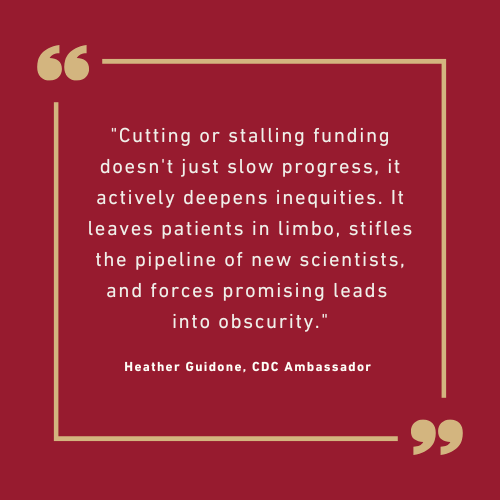
By Hillary Vrba, CDC Team Member
Academic institutions across the country are bracing for the Trump administration's proposed cuts to federal research funding which will likely cause major setbacks in scientific discovery and innovation.
The FY26 budget request slashes more than $31 billion in the Department of Health and Human Services (HHS) discretionary budget. These cuts will have a lasting impact on medical research and destroy funding for future disease prevention and treatments, according to the American Public Health Association.
Additionally, the National Institutes of Health (NIH), one of the 13 operating divisions within HHS, is poised to see its annual budget shrink 18% from $31.8 billion to $26 billion. This includes cuts to the National Cancer Institute ($1 billion), the National Heart, Lung and Blood Institute ($575 million), and the National Institute of Allergy and Infectious Diseases ($838 million).
Money from the NIH trickles down to universities across the country where researchers are awarded grant money through a selective application process. NIH is the primary funder of research into chronic conditions like heart disease, cancer, diabetes, and HIV. Fiscal tightening and canceled grants mean fewer clinical trials, slower development of treatments, and delays in discovery.
Not only will there be delays in innovation, but less funding for research will attract less talent to the field, especially postdocs and early-career scientists, who may leave academia or even the country, thereby shrinking the future workforce.
Heather Guidone, a member of our ambassador community, provides insight into the significant consequences of this funding reduction:

Aside from the tangible effects of funding cuts, many people often forget that research provides hope to individuals waiting on improved treatment options. Patients often refer to NIH as the National Institutes of "Hope" because they are the primary agency that produces new treatments and cures for diseases. These cuts ultimately take away hope for millions of people yearning for a new treatment or medication that could improve their quality of life.
Thankfully, a federal judge deemed some NIH grant cuts illegal and accused the administration of discriminating against racial minorities and LGBTQ people. U.S. District Court Judge William G. Young called the terminations "arbitrary and capricious” and ordered DEI-related grants to be reinstated immediately. However, Young's decision only applies to a portion of the administration's cuts to NIH funding.
The Chronic Disease Coalition will continue to monitor any developments as the FY2026 budget proposal is still pending in Congress.